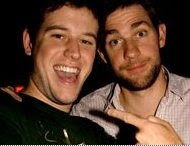 The scope of Slumdog Millionaire could be described as epic, with the characters' personal lives wrapped up in the ever changing historical and political landscape of modern India. The only problem with this description is that the decisions the characters make in their daily lives have no impact on the world around them. No, Jamaal and Salim, the two "slumdog" children who lose their mother to an anti-Muslim pogrom, are the people left behind by globalization. Their lives are the result of the economic changes of first Bombay, then Mumbai. At one point they are standing in a high-rise building in Mumbai looking over a sea of skyscrapers that was once the slums that they grew up in.
The scope of Slumdog Millionaire could be described as epic, with the characters' personal lives wrapped up in the ever changing historical and political landscape of modern India. The only problem with this description is that the decisions the characters make in their daily lives have no impact on the world around them. No, Jamaal and Salim, the two "slumdog" children who lose their mother to an anti-Muslim pogrom, are the people left behind by globalization. Their lives are the result of the economic changes of first Bombay, then Mumbai. At one point they are standing in a high-rise building in Mumbai looking over a sea of skyscrapers that was once the slums that they grew up in.The crux of the story is that Jamaal grows up to be a contestant on the Indian version of "Who Wants to be a Millionaire?", a show whose mere existence is certainly the result of unfettered global capitalism. As a Muslim slumdog who makes it further than any previous contestant, he is, of course, questioned and tortured under the assumption that he cheated. We discover that, in spite of his lack of education, every question just happens to correspond with some horrific moment in his life. Many easier questions, he insists, would have probably been much harder for him. It's just dumb luck--or, quite possibly, fate.
This may sound like the plot to an incredibly contrived story, except that it is handled so well that we believe every moment of it. Key to all of this is the performances of the actors, particularly those of the children, who play characters that live through extraordinary events with both sensitivity and endurance. They don't lament their bad luck any more than a Western teenager who is sick of going to school and growing up in a boring town--probably less so, because their survival skills require them to focus on getting food and shelter today, not begrudge their misfortune. To Jamaal and Salim, it is probably not so much "luck" as it is life--there is no other alternative, no better town or better job. They feel pretty lucky just to have a job.
 In many ways, this movie reminded me of Sergio Leone's Once Upon a Time in America. In both films, we see young men growing up in adverse conditions and facing the challenges of survival the only way they know how. Their fates are bound up with the forces around them and their options are very limited. But while Leone's vision is much more pessimistic and regretful, director Danny Boyle is able to find hope amidst poverty.
In many ways, this movie reminded me of Sergio Leone's Once Upon a Time in America. In both films, we see young men growing up in adverse conditions and facing the challenges of survival the only way they know how. Their fates are bound up with the forces around them and their options are very limited. But while Leone's vision is much more pessimistic and regretful, director Danny Boyle is able to find hope amidst poverty.You also can't help but describe Slumdog Millionaire as "Dickensian". Involving children orphaned in poverty, scheming money out of unsuspecting tourists, looking for their next meal out of the trash, and a beautiful young woman who will haunt the main character into manhood--that is a roundup of some of the best of Charles Dickens.
What Jamaal learns most of all is never to give up hope--no matter how bad his luck, or the luck of those around him, even though everything he learns about the world should teach him to be an arch-cynic. He may not have many prospects, but at least he might be able to save the girl he loved from a life of misery.
This isn't simply a fantastic fairy tale but rather the story of survival. And sometimes, if you survive long enough, good things can happen.





No comments:
Post a Comment